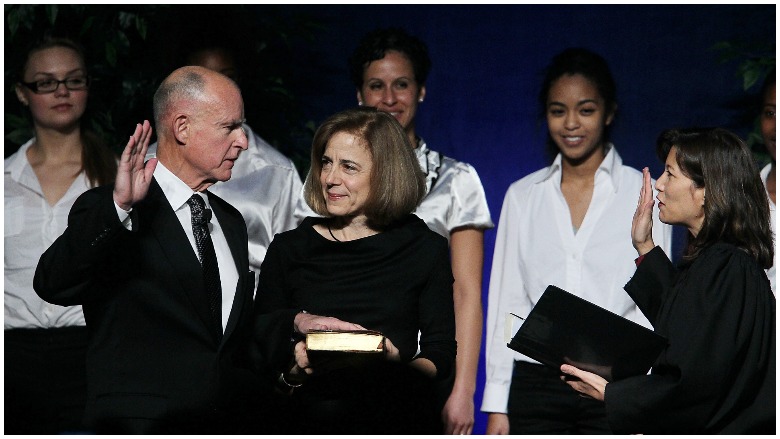
Tani Cantil-Sakauye is the chief justice of the California Supreme Court. Until recently, Cantil-Sakauye was a registered Republican. But on December 13, she told CALMatters that she had left the party and had registered as an unaffiliated voter.
Cantil-Sakauye said that she spent a long time agonizing over her decision. She said she felt deeply uncomfortable with the direction the party had taken, both on a state level and nationwide. But she said that what really tipped the scales was watching the Brett Kavanaugh hearings. That’s when she made her final decision to leave the Republican party.
Here’s what you need to know:
1. Cantil-Sakauye Said Her Family & Friends Encouraged Her to Leave the Party, Which They Said Had Already Left Her
Cantil-Sakauye didn’t make her decision to leave the Republican party lightly. The chief justice says she spent a long time considering things from every angle; she talked to trusted friends and to family to get their feedback. She told CALMatters that she was upset about the direction the Republican party was taking; and she said she finally made up her mind after watching the Kavanaugh hearings. Cantil-Sakauye didn’t go into detail about what bothered her in the hearings. But she told CALMatters, “you can draw your own conclusions.”
The chief justice also said that her closest confidants encouraged her to leave the party. She told CALMatters that, when she asked for their views, they told her, “you didn’t leave the party. The party left you.” This seems to suggest that her husband and her friends believed that the Republican party has evolved over the years, so much so that it’s not the same party that Cantil-Sakauye joined as a young woman.
2. Cantil-Sakauye Says Embracing ‘California Values’ Means Caring About Climate Change, Homelessness, and Guns
Earlier this week, Cantil-Sakauye held a “state-of-the-judiciary” briefing — an event where she, as the Chief Justice, talked about the direction she wants the court to take in the coming year. She praised the 600 new court appointees made this year by the state’s Democratic governor, Jerry Brown. And she talked about what she called “California values.” Her “California values” included caring about homelessness, climate change and, in her words, “what are we going to do about guns.” She also said that California values include always supporting the underdog.
Cantil-Sakauye has also repeatedly criticized the Trump administration for its treatment of undocumented immigrants. Last year, she sent a letter to then-Attorney General Jeff Sessions and John Kelly to complain about ICE agents who were arresting undocumented immigrants who appeared in court on charges that had nothing to do with immigration. In some of the cases, the undocumented immigrants were appearing in court as witnesses or as victims. Cantil-Sakauye wrote that she was “deeply concerned” to learn that “immigration agents appear to be stalking undocumented immigrants in our courthouses to make arrests.” She argued that the move would reduce trust in the government and create unecessary fear: “Most Americans have more daily contact with their state and local governments than with the federal government, and I am concerned about the impact on public trust and confidence in our state court system if the public feels that our state institutions are being used to facilitate other goals and objectives, no matter how expedient they may be.”
In response, Sessions said that her letter was “troubling” and that she should take up her concerns with the governor of California.
3. Cantil-Sakauye Was Nominated to the Supreme Court by Republican Governor Arnold Schwarzenegger

GettyCalifornia Supreme Court Justice Tani Cantil-Sakauye swears in Governor Jerry Brown
In 2010, Governor Schwarzenegger appointed Cantil-Sakauye to the California Supreme Court. She was unanimously approved for
a seat on the court. Schwarzenegger had previously appointed her to the California Third District Court of Appeal in 2004.
When he appointed her in 2010, Schwarzenegger said, “Justice Tani Cantil-Sakauye has a distinguished history of public service and understands that the role of a justice is not to create law, but to independently and fairly interpret and administer the law.” She was generally described as a moderate.
A soon-to-be-released study from the California Constitution Center shows that California’s Supreme Court justices don’t tend to vote along party lines. David A. Carrillo, the executive director of the California Constitution Center, said California tends to be less polarized than most of the country. And, Carillo said, the state’s court reflects that too.
4. Cantil-Sakauye Is the Daughter of Farm Workers & Is Now the First Asian-Filipina Judge on the California Supreme Court
Cantil-Sakauye grew up in Sacramento, California. Her father, Clarence, was Filipino-Portuguese; he worked picking pineapples in Hawaii before moving to California. Her mother, Mary, was also part of a Filipino farm worker family who traveled all over California, following the harvest in search of jobs. Cantil-Sakauye says that as a young girl, she also picked tomatoes on the weekends. She said her family was “humble” and that, although they never went without necessities, they also never had any luxuries. She described a “very, very humble” lifestyle, with “no frills, no junk food, no gifts, nothing of any kind.”
Eventually, she graduated from UC Davis and went on to law school, also at UC Davis, working as a waitress and a blackjack dealer to pay her way through school. She said that during law school, she and a friend of hers lived “like church mice in a beat-up apartment, hardly any electricity, we ate at the casino on the discounted food and we rode bikes to work.” She joined the Sacramento DA’s office in 1984 and then, at age 30, was appointed to the bench.
5. Her Husband’s Parents Were Japanese-Americans Who Were Sent to the Japanese Internment Camps During World War II
Cantil-Sakauye told the New York Times that her husband’s family were farm workers who became farmers. Then, during World War Two, they were sent to an internment camp for Japanese Americans. (The government was concerned that Japanese Americans might sympathize with the Japanese government, which was at war with the United States.)
Cantil-Sakauye told the Times a little about her husband’s family and their life in the camp. She said, “His grandmother developed breast cancer at a camp in Colorado and a Japanese doctor performed a double mastectomy. Because there was basically no treatment she died shortly thereafter. His parents have spoken about it more and more as they have gotten older but none of them have any interest in going there and doing a tour. They honor it but they don’t want to revisit it.”
Cantil-Sakauye said that hearing her in-laws’ stories helped motivate her to fight for immigrants’ rights and to take a stand against the Trump administration’s immigration policies.